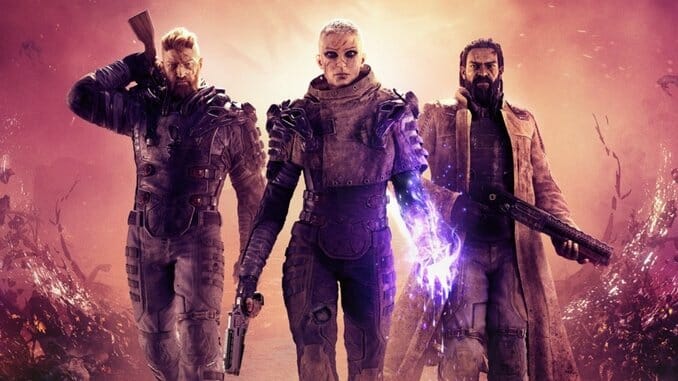Outriders Can’t Outride Its Lack of Ambition

The original Gundam 0078 anime series opens with an attack on a rotating colony space station in orbit around the earth. The attack was carried out by a space-born empire, The Principality of Zeon, which is seeking independence for their colonies from Earth’s influence. The show is framed from the perspective of the Earth Federation, which are painted out to be the good guys in the mess. But over the series, layers of hidden politics emerge and the viewer is left with the sense that there are good people on both sides of the war, and the cause of the Zeon proves righteous, even if their methods are brutal.
This level of nuance allows the later entries in the Gundam universe to play around with who is and isn’t the villain, with characters regularly switching sides and their morals on full display. Despite having a similar premise to Gundam 0078, Outriders manages to divorce its setting from any sort of deeper analysis, espousing morals that are regularly contradicted and ultimately saying nothing about anything.
Since Outriders isn’t meant to be just a game, but the start of a whole sci-fi franchise with transmedia ambitions, let’s go deep into the story. It takes place in the somewhat distant future after a series of increasingly devastating natural disasters renders the Earth uninhabitable. Two interstellar ships carrying 500,000 cryogenically frozen colonists each are set to travel to a potentially livable planet called Enoch, but only one ship, the S.M. Flores, is able to launch. As an Outrider, your character is one of the first colonists to be unfrozen and sent down to Enoch to scout the planet. But the planet is not as hospitable as once thought.
On the first expedition out, your team of Outriders is attacked by a black fungus that quickly kills a number of them. The Outriders then attempt to race back to their basecamp to warn the Flores to hold off on sending down more people, but an over-eager commander gives the go-ahead anyways. An anomalous, electric storm begins forming seemingly out of nowhere, turning some Outriders into ash and mortally wounding others, including yourself.
In a desperate attempt to save your life a fellow landing party member, Shira Gutmann, pushes you back into your cryogenic pod. 30 odd years pass, and your character awakes to a war torn world. After managing to find Gutmann, now leader of the Enoch Colonization Authority, the player learns that the anomalous storm knocked out the fledgling colony’s power before they could prepare for all 500,000 people to be unfrozen, and has also trapped everyone inside a single valley on the planet. In addition, the still-orbiting Flores only shot down half the supply pods it was supposed to.
With almost all the colonists awoken and not enough resources to go around, the ECA effectively banished the new colonists outside their walled city. The abandoned colonists become insurgents, and a forever war is launched between the two groups. In the middle of this war are the altered, people who have been hit by the anomaly and not only survived, but gained godlike powers. And lucky you, the player character is one of these godlike people. Gutmann points you in the direction of a signal that she thinks will be pivotal in getting the Flores to shoot down the remainder of the pods, and you’re off.

It’s a setting dripping with potential, but rarely does anything meaningful or unexpected occur. The first time the player sees the insurgents, they’re shown to be child eaters, slavers, and the kind of crazy only seen in the post-apocalypse genre. After learning a bit more about the world these insurgents were dumped into, I couldn’t help but empathize with them; I too would be pretty pissed if I woke up and was kicked out of the only city in existence. I kept waiting for the game to humanize the insurgents and really delve into the situation it had created, but it never does.
There were plenty of times where Outriders’ story felt like it was on the cusp of saying something, before falling silent. Early-on, the player is introduced to an altered named Seth. Seth’s painted out to be the altered, and touts himself as a god. He regularly fights alongside the ECA, but is not directly aligned with them and is more interested in keeping a balance between the sides; the insurgents, being closer to the anomaly, have a lot more altered fighting on their side. He forces the player to confront their godliness: “These people need their Gods. Only one like you could lead them to a future.”
But before the player can learn more about Seth’s outlook on the war and striking a balance between the ECA and the insurgents, he bites the dust. From that point on, most of the game just sort of happens. There’s no suspense or guesswork expected from the player. If a bad dude looks bad, it’s because he is bad and it’s your job to make him not exist anymore.
It’s a shame because 90% of the time, making people not exist anymore in Outriders is an engrossing experience. There’s a tendency in power fantasy games to limit the player’s abilities to maintain some concept of balancing. Outriders largely does away with this.
Four classes of anomaly power are available to players, each with their own abilities and focus on combat styles. These abilities weave together with the game’s gunplay to produce segments of nonstop action, and the game itself offers numerous areas for this action to occur.
